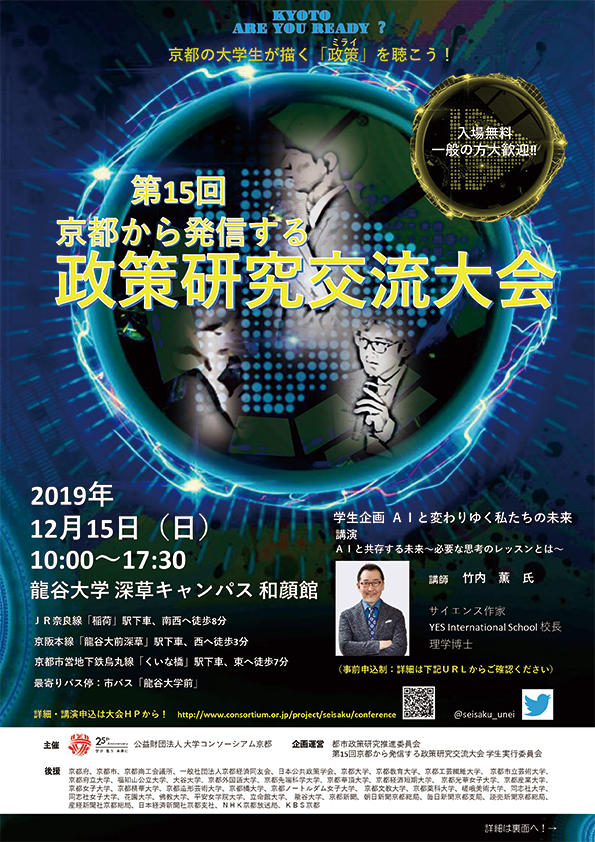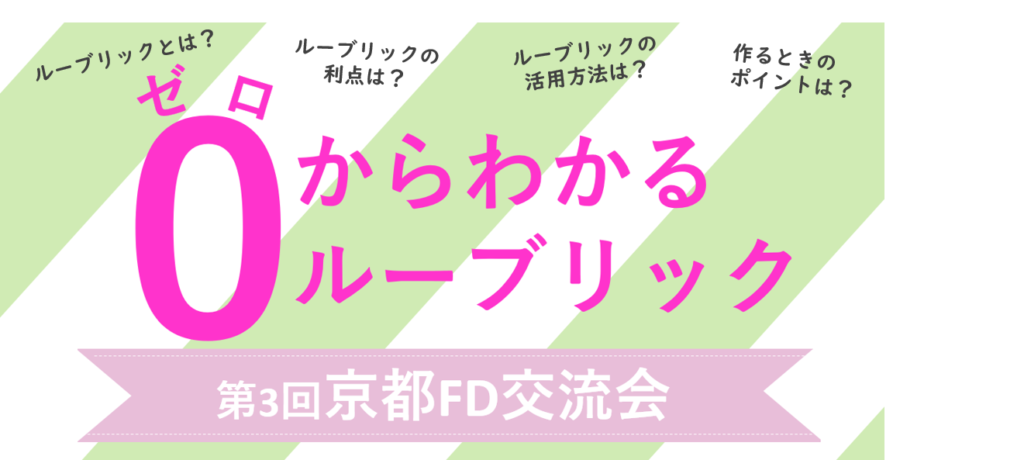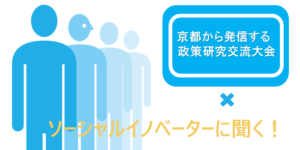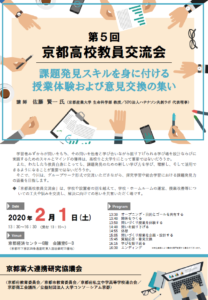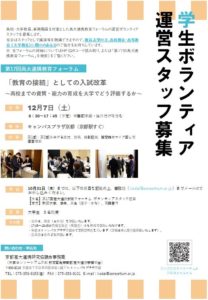In the “Long-Term Project Course” internship program of the University Consortium Kyoto, from mid-June to mid-November, trainees worked on projects presented by host companies. At the project presentations held on Saturday, November 9, the results were reported by eight projects. Presentations were made with videos and creative formats, and students from other projects were able to share their experiences. After about five months of activities, the participants were able to see the importance of collaborating with their peers and the difficulty of achieving their goals.
At the completion ceremony, the coordinator handed out a certificate of completion for each project, and the 2019 internship program “Long-term Project Course” was completed.
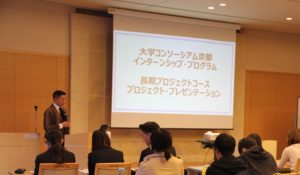
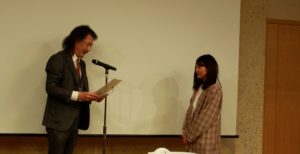
| Date & Time |
Saturday, November 9, 2019 13:00~17:50 |
| Venue |
Campus Plaza Kyoto 2nd Floor Hall
|
project
Participating Companies
Number of Organizations
(Achievement Report)
In order of presentation) |
8Companies and Organizations
Wine Grocery Co., Ltd. / University Consortium Kyoto / Day Alive Co., Ltd. / Non-profit organization Kino Keiku / Kansai Makitori Foil Industry Co., Ltd. / Ueda Co., Ltd. / Insight House Co., Ltd. / Kyoto Prefectural Board of Education
|
| Number of students |
25 students from 15 universities
(Otani University, Kyoto Koka Women’s University, Kyoto Institute of Technology, Kyoto Sangyo University, Kyoto Women’s University, Kyoto University of Advanced Science, Kyoto Notre Dame Women’s University, Kyoto University of Arts and Crafts, Kyoto Bunkyo University, Doshisha University, Doshisha Women’s University, Hanazono University, Bukkyo University, Ritsumeikan University, Ryukoku University)
|
| Number of Coordinator Teachers |
7
(Kyoto Koka Women’s University, Kyoto Koka Women’s University Junior College, Kyoto Institute of Technology, Kyoto Women’s University, Kyoto Seika University, Fukuchiyama Public University, Ryukoku University)
|
Wine Grocery Inc.
~Wine seminar planning and holding projects for students~
Considering the wine market, which is at risk of shrinking in the future due to young people moving away from alcohol, this project plans and implements a “wine seminar for students” to make young people aware of the appeal of wine and become future customers.
In preparation for the wine seminar, we created and distributed flyers to attract customers, posted them on social media, and presented the contents of the preparations and operations on the day of the seminar. In the questionnaire after the seminar, the participants were highly satisfied, and some said that they felt closer to wine, and they were able to fulfill the objectives presented by the host company. In addition, the trainees were grateful to the host company for gaining a wide range of knowledge about wine.
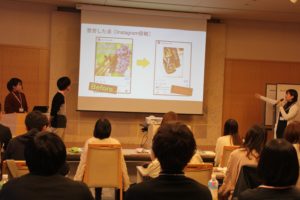
University Consortium Kyoto
~IS Program Fascinated by Images~
A project to create a PR video to effectively promote the internship program “Long-term Project Course” of the University Consortium Kyoto.
Under the guidance of the coordinator in charge on how to shoot and edit the video, we compiled a three-minute video that covered and interviewed the activities of each project and made it into a three-minute video that could be used for guidance and other public relations. I felt that the editing process of the video was not progressing, so I created a scenario, worked efficiently, and reported that if there were any new discoveries in the interview and editing, I changed the plan and completed the video. The resulting video shows the lively expressions of the students participating in the project.
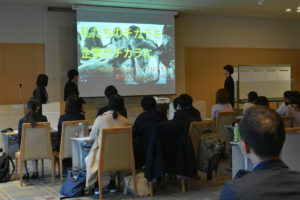
Day Alive Inc.
~Kyoto’s Inbound Tourism Information Media Renovation and New Business Plan~
This project aims to raise the profile of “Traveler’s Voice of Kyoto,” a visual media that delivers the voices of foreign tourists.
In order to introduce Kyoto and contribute to the community, we found unknown places and places where you can have extraordinary experiences, conducted interviews and interviews, uploaded them to Instagram, and created a free paper. In addition to using attractive photo slides, the video included the interview, and it was reported that the number of articles posted and the number of followers were achieved at the beginning.
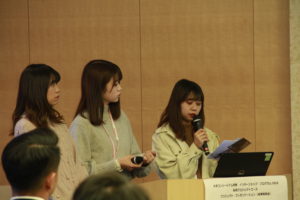
Non-profit organization Kino Environment
~Production of environmental education tools~
This is a project to come up with environmental education tools related to garbage and deepen everyone’s understanding of the environment.
The project we planned was to create “disposal site cards” about waste treatment facilities so that children would be interested in the environment, and to install the cards at waste treatment facilities. When we prepared a project outline and negotiated the installation of the card, it was decided that it could not be realized due to the problems of Mr. Mr./Ms. for installation, but we summarized the activities so far in the “Report Report”. It was a valuable opportunity to experience the difficulties of launching and realizing a project, and he would like to make use of it in the future.

Kansai Winding Foil Industry Co., Ltd.
~PROJECT TO DISSEMINATE MADE IN JAPAN’S MANUFACTURING TO THE WORLD~
This is a project to promote the unknown charms of Kyoto’s companies, such as amazing technologies and interesting products, from the perspective of students.
We created multiple 5-second videos for the purpose of corporate publicity, which will be shown at a joint company exhibition in the Kyoto area in October. In the creation of the video, we referred to the opinions of other companies and worked on the work until the students were satisfied, so that the students and the host company were able to agree on the work. The presentation was a free talk, and it was devised so that the audience would not get bored.
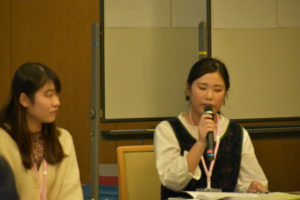
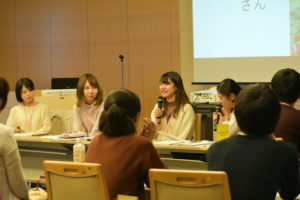
Ueda Co., Ltd. Head Office
~Planning and operation for matching events between companies and students~
This is a project to plan and implement a “company visit tour,” which is a matching event between students and outstanding companies in Kyoto that are unknown to students.
We mainly reported on the selection of companies, making appointments, scheduling, attracting students to participate, and the state of the event on the day of the event. In the first half of the event, we visited two companies, and in the second half, we planned group work to exchange opinions on “what axes I want to value in terms of future work styles” and “what is a good company for me?” Participants were highly satisfied, and we were able to read the results from the numbers.
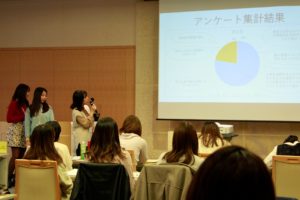
Insight House Inc.
~Yamashina Mr./Ms. Project~
This is a project to disseminate the revitalization and charm of Yamashina Ward, Kyoto City on SNS, and to create and introduce a free paper.
We negotiated interviews with places and people we were interested in in the Yamashina area, and conducted about 20 interviews. In addition to posting on Facebook and Instagram about the restaurants and other sites we were interviewing, we also reported on the fact that we posted them in free papers and distributed the free papers we created to the stores where they were posted. I could feel that the trainees were familiar with the Yamashina area and supported their activities.
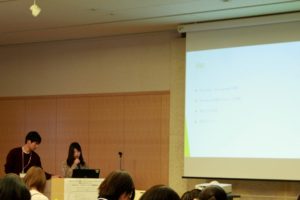
Kyoto Prefectural Board of Education
~Teacher Training Support Seminar~
Training schools: Higashi-Uji Junior High School, Mukai Elementary School, Kando Elementary School, Uji City
This is a program in which trainees repeatedly learn and reflect on their individual and group goals through practical training at a training school, and grow.
Through the guidance of the teachers at the seminar school, I was able to discover the skills that I need to develop in order to become a teacher, and I was able to find my future challenges.
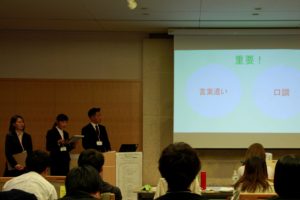
get-together
After the project presentations, a social gathering was held. Hosted by four trainees, the event was a lively event with games such as self-introduction bingo and sudden interviews, and the trainees and coordinators were able to interact frankly.
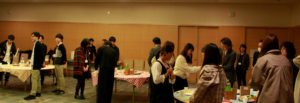
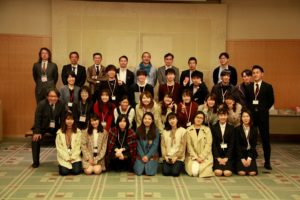
Inquiries
University Consortium Kyoto Internship Project Promotion Office
TEL 075-353-9106 FAX 075-353-9101
〒600-8216 Shimogyo-ku, Kyoto-shi, Nishitoin-dori, Shiokoji, Shimo-ku, Kyoto, Campus Plaza Kyoto
* Reception hours: Tuesday ~ Saturday 9:00 ~ 17:00 (excluding year-end and New Year holidays)














